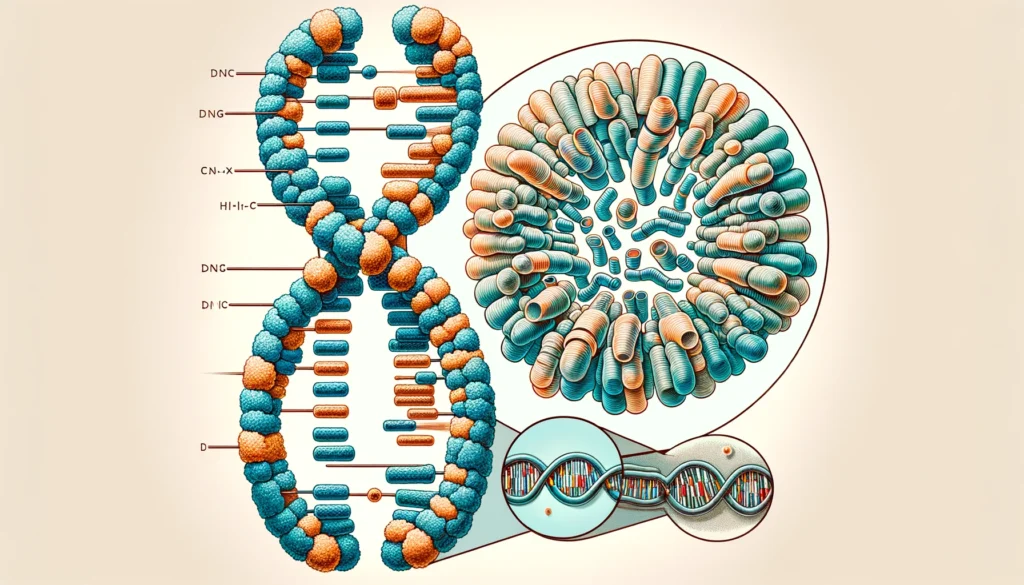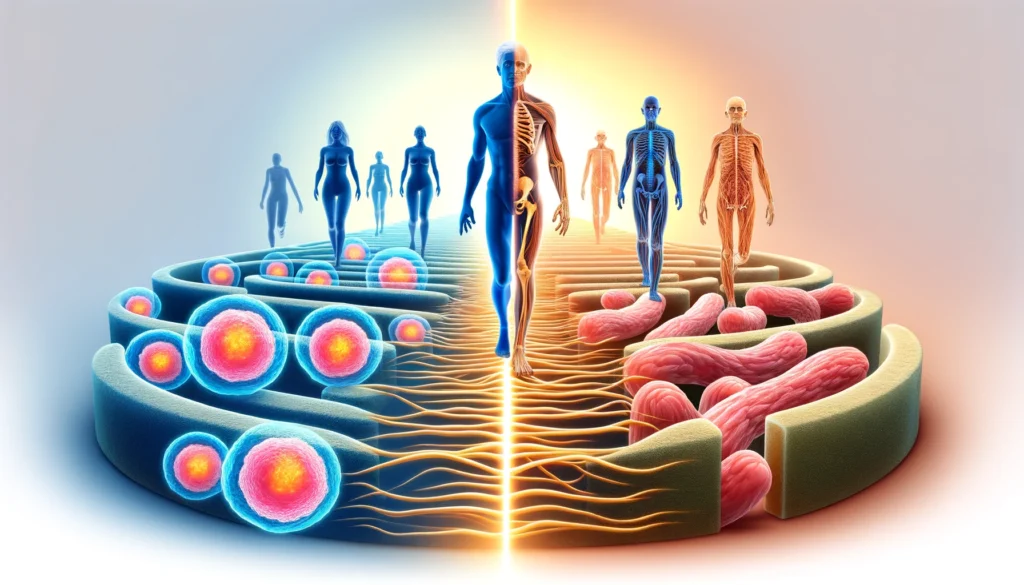Have you ever wondered why we age and what might be at the core of this inevitable process? Imagine if there were a biological clock within each cell of our body, ticking away and determining the lifespan of our cells, and thereby, perhaps, our overall longevity. This is not just a figment of science fiction; it’s a reality, and it’s encapsulated in the tiny yet powerful structures known as telomeres.
Telomeres are like the plastic tips at the ends of shoelaces, preventing our chromosomes from fraying and sticking to each other, which would scramble our genetic information and cause chaos in our cells. Each time a cell divides, its telomeres get a little shorter, until they reach a critical length that signals the cell to age and eventually die. This natural process is a key player in the complex symphony of aging, but it’s not just about getting older; it’s also about our health, our disease susceptibility, and how we might influence our biological destiny.
In this blog, we will unravel the mystery of telomeres, exploring their vital role in our bodies, how they contribute to the aging process, and the intriguing research that suggests we might have some control over their influence on our health and longevity. So, buckle up for a journey into the microscopic world that has macroscopic implications for us all!
What are Telomeres?
Telomeres are often likened to the aglets on the ends of shoelaces, those small plastic tips that keep the laces from unraveling. Just as aglets preserve the integrity of shoelaces, telomeres protect our chromosomes—the long strands of DNA that carry our genetic information—from deteriorating or fusing with neighboring chromosomes. These protective caps consist of repetitive sequences of DNA and are located at the ends of each chromosome.

As cells divide, which is essential for the growth, healing, and maintenance of our bodies, their DNA must be copied. However, each time this happens, a small section of the DNA at the ends, the telomere, is not replicated. This leads to telomeres getting progressively shorter with each cell division. In young cells, telomeres are long enough to allow for many rounds of division. But as we age, they become too short to function correctly, signaling the cell to stop dividing, enter a state of senescence, or undergo programmed cell death (apoptosis).
This shortening process is natural and acts as a biological clock that limits the lifespan of cells. But it’s not just a countdown; the length of telomeres can be influenced by various factors, including stress, lifestyle, and environmental exposures. Understanding the delicate balance of telomere length and its regulation is key to unraveling the mysteries of aging and the path to longevity.
Telomeres and the Aging Process
- The Biological Clock of Aging
Telomeres serve as a biological clock, their length determining the number of times a cell can divide. As we age, our telomeres naturally shorten. This shortening is a fundamental aspect of the aging process at the cellular level, limiting the cell’s ability to reproduce and function over time. When telomeres become critically short, cells enter a state of senescence (aging) or die, which contributes to the aging of the organism as a whole.

- The Link Between Telomeres and Cellular Aging
The connection between telomeres and cellular aging is not just about the number of cell divisions. Short telomeres can trigger a range of cellular processes that lead to tissue deterioration and organ decline, hallmark traits of aging. Studies have shown that shorter telomeres are associated with age-related diseases and conditions, such as heart disease, Alzheimer’s disease, and certain cancers, suggesting a strong link between telomere length and biological aging.
Telomeres and Health
- Telomeres as Biomarkers for Longevity
The length of telomeres is also being studied as a potential biomarker for longevity. Individuals with longer telomeres tend to have a lower risk of chronic diseases and may have a longer lifespan. However, it’s important to note that telomere length is influenced by a combination of genetics, lifestyle, and environmental factors. Therefore, while telomere length can provide insights into health and aging, it is not the sole determinant of an individual’s lifespan or health span.

- Impact on Age-Related Diseases
Telomere length is a key player in the realm of age-related diseases. Shorter telomeres have been linked to a higher risk of developing conditions like cardiovascular disease, diabetes, and certain types of cancer. This link suggests that the rate at which telomeres shorten can be an indicator of an individual’s disease risk as they age.
Lifestyle and Telomere Length
- The Effect of Lifestyle Choices
Our daily habits and choices have a profound impact on the length and health of our telomeres. Studies have shown that stress, smoking, lack of exercise, and poor diet can accelerate telomere shortening, while a healthy lifestyle can slow it down. For instance, regular physical activity, a balanced diet rich in antioxidants, and stress-reducing practices like meditation have been associated with longer telomeres.
- Nutrition and Telomere Maintenance
Diet plays a crucial role in telomere health. Foods high in vitamins and antioxidants, such as fruits, vegetables, nuts, and seeds, can protect telomeres from oxidative stress and inflammation, which contribute to their shortening. Conversely, processed foods, high in sugar and unhealthy fats, can accelerate telomere degradation.

- Psychological Stress and Telomere Length
Stress is another significant factor affecting telomere length. Chronic stress and the body’s response to it, through the release of cortisol and other stress hormones, can lead to telomere shortening. Engaging in stress management techniques like mindfulness, yoga, or even regular social interactions can help protect telomeres by reducing the physiological impact of stress.
- The Influence of Diet and Nutrition
What we eat can have a profound impact on the length of our telomeres. Diets rich in antioxidants, vitamins, and omega-3 fatty acids are believed to protect telomeres from premature shortening. Foods like berries, nuts, leafy greens, and fatty fish are not only nutritious but may also help preserve telomere length, contributing to healthier aging.
- Exercise and Telomere Maintenance
Regular physical activity is another crucial factor in maintaining telomere length. Exercise, especially aerobic and cardiovascular activities, has been shown to slow the rate of telomere shortening. This protective effect is one of the many reasons why regular exercise is associated with increased longevity and reduced risk of chronic diseases.

- Stress Management and Telomere Health
Chronic stress can accelerate telomere shortening, leading to earlier cellular aging and increased health risks. Stress management techniques like meditation, yoga, and mindfulness can help reduce the impact of stress on telomeres. By managing stress effectively, individuals can potentially slow the aging process at the cellular level and promote overall health.
- Sleep Quality and Telomere Length
Good sleep is essential for overall health, and it also appears to play a role in telomere maintenance. Poor sleep quality and short sleep duration have been linked to faster telomere shortening. Ensuring adequate and restful sleep can support telomere length and contribute to better health and longevity.
The Future of Telomere Research
- Advancements in Telomere Science
The study of telomeres has made significant strides over the past few decades, and researchers continue to unravel the complex relationship between telomeres, aging, and health. Advances in technology and genetics are enabling scientists to better understand how telomere length is regulated and how it can be influenced by various factors, including lifestyle interventions and medical treatments.
- Potential for Anti-Aging Therapies
One of the most exciting prospects in telomere research is the development of therapies aimed at preserving or even lengthening telomeres. Such therapies could potentially slow the aging process and extend human healthspan, reducing the incidence of age-related diseases. However, this research is still in its early stages, and any practical applications will require careful consideration of the ethical implications and long-term effects.

- Ethical Considerations and Longevity
As with any scientific advancement, the potential to manipulate telomere length raises important ethical questions. The prospect of extending life significantly comes with considerations about the quality of life, overpopulation, resource allocation, and the natural course of human life. These are topics that society will need to address as the science progresses.
- A Holistic View on Aging and Health
While the potential for direct intervention on telomeres is captivating, it’s crucial to remember that aging and health are multifaceted processes influenced by a wide range of factors. A holistic approach to health, incorporating balanced nutrition, regular physical activity, stress management, and adequate sleep, remains the cornerstone of promoting longevity and well-being.
Conclusion
The exploration of telomeres and their significant role in the aging process opens a window into the intricate mechanics of our biology. These tiny structures at the ends of our chromosomes are more than just biological oddities; they are central players in the narrative of our life’s journey, from birth through aging. Understanding telomeres has not only expanded our knowledge of cellular aging but also offered glimpses into potential futures where managing telomere length could help us lead longer healthier lives.
However, the pursuit of longevity through telomere science is not just a quest for extended life but a quest for a life well-lived, full of vitality and health. It reminds us of the importance of nurturing our bodies and minds through healthy lifestyle choices, which remain the most accessible and effective means of influencing our health and lifespan.

As we stand on the brink of new scientific discoveries, the study of telomeres encourages us to think about aging not as an inevitable decline but as a process that we can understand respect, and perhaps influence. The journey through the microscopic world of telomeres teaches us about the vast potential of human health and the timeless quest for understanding the secrets of life itself.
Author’s Note
As a writer deeply fascinated by the science of aging, exploring the world of telomeres has been an enlightening journey. The intricate dance between our genetic blueprint and the ticking clock of telomeres offers a glimpse into the future of health and longevity. This blog aims to demystify the complex science of telomeres and present it in a way that is accessible and intriguing to everyone. May this journey inspire you to think about the longevity of not just life, but also health, as we continue to unravel the secrets of our biological existence.
G.C., Ecosociosphere contributor.
References and Further Reading
- “The Telomere Effect: A Revolutionary Approach to Living Younger, Healthier, Longer” by Elizabeth Blackburn and Elissa Epel – This book provides a deep dive into how telomere length affects aging and health, offering practical advice for extending telomeres’ healthful lifespan.
- “Telomere Biology” by Titia de Lange and Elizabeth Blackburn – A comprehensive guide to the molecular biology of telomeres, detailing the latest research and implications for health and disease.
- “Why We Age: What Science Is Discovering about the Body’s Journey Through Life” by Steven N. Austad – While not solely focused on telomeres, this book offers insights into various aspects of aging, including the role of telomeres.





Comments
Your point of view caught my eye and was very interesting. Thanks. I have a question for you.
Can you be more specific about the content of your article? After reading it, I still have some doubts. Hope you can help me.
Thanks for sharing. I read many of your blog posts, cool, your blog is very good.
Thank you for your sharing. I am worried that I lack creative ideas. It is your article that makes me full of hope. Thank you. But, I have a question, can you help me?
Your point of view caught my eye and was very interesting. Thanks. I have a question for you.
Can you be more specific about the content of your article? After reading it, I still have some doubts. Hope you can help me. https://accounts.binance.com/register?ref=P9L9FQKY
Thank you for your sharing. I am worried that I lack creative ideas. It is your article that makes me full of hope. Thank you. But, I have a question, can you help me?